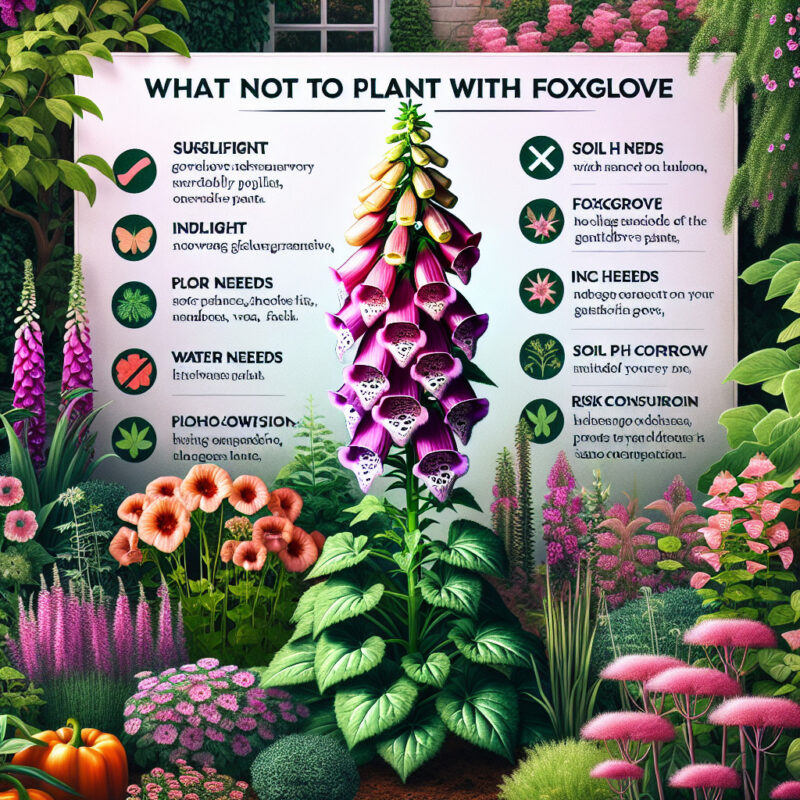Foxglove, scientifically known as Digitalis purpurea, is a visually striking flower that adds elegance and color to any garden. Known for its bell-shaped blooms and tall spikes, foxglove has captured the attention and admiration of many gardening enthusiasts. However, it is crucial to exercise caution when selecting companion plants to grow alongside foxglove. While certain plants can enhance its beauty and overall health, others can negatively impact its growth and potentially harm the foxglove plant. Hence, it becomes imperative for gardeners to be aware of what not to plant with foxglove to ensure a thriving garden ecosystem and the longevity of these enchanting flowers.
key Takeaways
- Foxglove should not be planted with vegetables or herbs as it can inhibit their growth and attract pests.
- Avoid planting foxglove near other plants that are susceptible to powdery mildew or rust diseases.
- Keep foxglove away from plants that require full sun, as it prefers partial shade and can shade out other plants.
- Do not plant foxglove near plants with shallow roots, as it has deep root systems that can compete for nutrients and water.
- Be cautious when planting foxglove near pets or children, as all parts of the plant are highly toxic if ingested.
What Not To Plant With Foxglove: A Comprehensive Guide
Foxglove Overview
Foxglove, scientifically known as Digitalis purpurea, is a stunning flowering plant that belongs to the family Plantaginaceae. Known for its tall spires of tubular flowers, foxgloves add charm and beauty to any garden. However, it’s important to be cautious when selecting companion plants to grow alongside foxglove, as not all plant combinations are suitable. Understanding what not to plant with foxglove is crucial to ensure the health and growth of this delicate plant.
Aggressive Spreaders
One of the major considerations when selecting companion plants for foxglove is their growth habits. Avoid planting aggressive spreaders near the foxglove as they can quickly overtake and smother this delicate plant. Aggressive spreaders, such as mint (Mentha spp.), can aggressively colonize the garden bed and compete for resources, leading to stunted growth and poor flowering in foxglove.
Competitors for Nutrients
When choosing plants to grow alongside foxglove, it is crucial to consider their nutrient requirements. Plants that are heavy feeders or have similar nutrient needs as foxglove can put excessive strain on the soil, leading to nutrient deficiencies. Avoid planting nutrient-hungry plants like tomatoes (Solanum lycopersicum) near foxglove, as they will compete for essential minerals and elements, negatively impacting the growth and vitality of the foxglove plant.
Shade-Loving Plants
Foxgloves thrive in partially shaded areas and can struggle when exposed to too much direct sunlight. Therefore, it is important to avoid planting sun-loving or heat-tolerant plants near foxglove, as they can create too much shade and hinder its growth. Instead, opt for shade-loving plants like hostas (Hosta spp.) or ferns (Filicophyta). These plants can provide a complementary aesthetic while ensuring that the foxglove remains in optimal conditions.
Susceptible to Pests and Diseases
Foxgloves are susceptible to a range of pests and diseases, and planting certain companions can exacerbate these issues. Avoid planting susceptible plants, such as roses (Rosa spp.) or tomatoes, in close proximity to foxglove to prevent the spread of pests and diseases. Mixing these plants can create a favorable environment for pathogens, reducing the overall health and vigor of the garden.
Toxicity Concerns
While foxglove adds beauty to the landscape, it is important to note that the entire plant is highly toxic if ingested. This toxicity extends to other plants nearby that might be consumed by animals or curious children. Therefore, it is crucial to avoid planting edible plants like herbs or vegetables alongside foxglove to prevent accidental poisoning. Keep a safe distance between foxglove plants and any consumable vegetation.
What are the best companions for Foxglove?
When choosing companions for your Foxgloves, it is important to consider plants that have similar cultural requirements and will not compete with the Foxgloves for resources. Here are some great options:
Can I plant Foxglove with Roses?
While Foxgloves and roses can make for a visually stunning combination, it is generally not recommended to plant them together. Both plants have specific soil and water requirements, and they may compete for these resources. Additionally, roses are prone to certain diseases, such as blackspot, which can spread to Foxgloves. It is best to plant them in separate areas of the garden to ensure their individual needs are met.
What about planting Foxgloves with Delphiniums?
While both Foxgloves and Delphiniums are tall, showy flowers that create a beautiful vertical display, they have different growing requirements. Foxgloves prefer part shade and moist, well-draining soil, while Delphiniums thrive in full sun and rich, fertile soil. Planting them together may result in one plant outcompeting the other or both plants not reaching their full potential. It is best to establish separate areas for Foxgloves and Delphiniums to ensure they receive the conditions they prefer.
What other plants are suitable companions for Foxglove?
There are several plants that pair well with Foxgloves. Some suitable companions include:
- Lupines
- Campanulas
- Astilbes
- Ferns
- Hostas
These plants have similar growing requirements and can complement the tall spires of the Foxgloves. Planting them together can create a visually pleasing and harmonious garden display.
Can I plant Foxgloves near vegetables?
It is generally not recommended to plant Foxgloves near vegetables. While Foxgloves are primarily grown as ornamental flowers, all parts of the plant, especially the leaves and seeds, contain toxic compounds. Planting them near vegetables may pose a risk of contamination if any part of the Foxglove is accidentally ingested. It is best to keep the Foxgloves in a separate area away from the vegetable garden for safety reasons.

